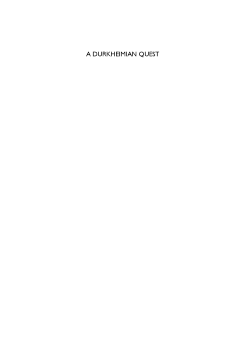
Additional Information
Book Details
Abstract
Durkheim, in his very role as a ‘founding father’ of a new social science, sociology, has become like a figure in an old religious painting, enshrouded in myth and encrusted in layers of thick, impenetrable varnish. This book undertakes detailed, up-to-date investigations of Durkheim’s work in an effort to restore its freshness and reveal it as originally created. These investigations explore his particular ideas, within an overall narrative of his initial problematic search for solidarity, how it became a quest for the sacred and how, at the end of his life, he embarked on a project for a new great work on ethics. A theme running through this is his concern with a modern world in crisis and his hope in social and moral reform. Accordingly, the book concludes with a set of essays on modern times and on a crisis that Durkheim thought would pass but which now seems here to stay.
William Watts Miller is editor of the journal, Durkheimian Studies, author of various books and articles on Durkheim as well as of translations of his writings and is one of the team of international scholars co-operating on the first critical edition of Durkheim’s Complete Works.
“Watts Miller provides a meticulous, conscientious, and unpretentious reading of Durkheim, rooted in deep acquaintance not only with his unpublished lectures but also with the writing of his contemporaries…The strength of Watts Miller's book is that it harks back to a Durkheim of complexity and rich ambiguity.” · Choice
“…a brilliant piece of scholarship. It is exhaustive and extensively documented. Included are a series of tables that help us connect Durkheim’s antecedent lectures to the completed text of The Elemental Forms, compare his various definitions of religion, and trace the temporal progression of his work…this book would be an appropriate text in a graduate level social theory class and is a must read for any graduate level seminar focused on the work of Emile Durkheim.” · International Social Science Review
“This work is certainly densely written and requires an attentive reading; but the reader will be amply rewarded in his or her efforts to comprehend Durkheim’s way of developing his ideas. For beyond specific hypotheses about this or that point, reading Watts Miller’s study offers one of those rare occasions to approach the ‘sociological imagination’ that C.W. Mills honored with special praise in an essay in 1959.” · Archives de sciences social des religions
